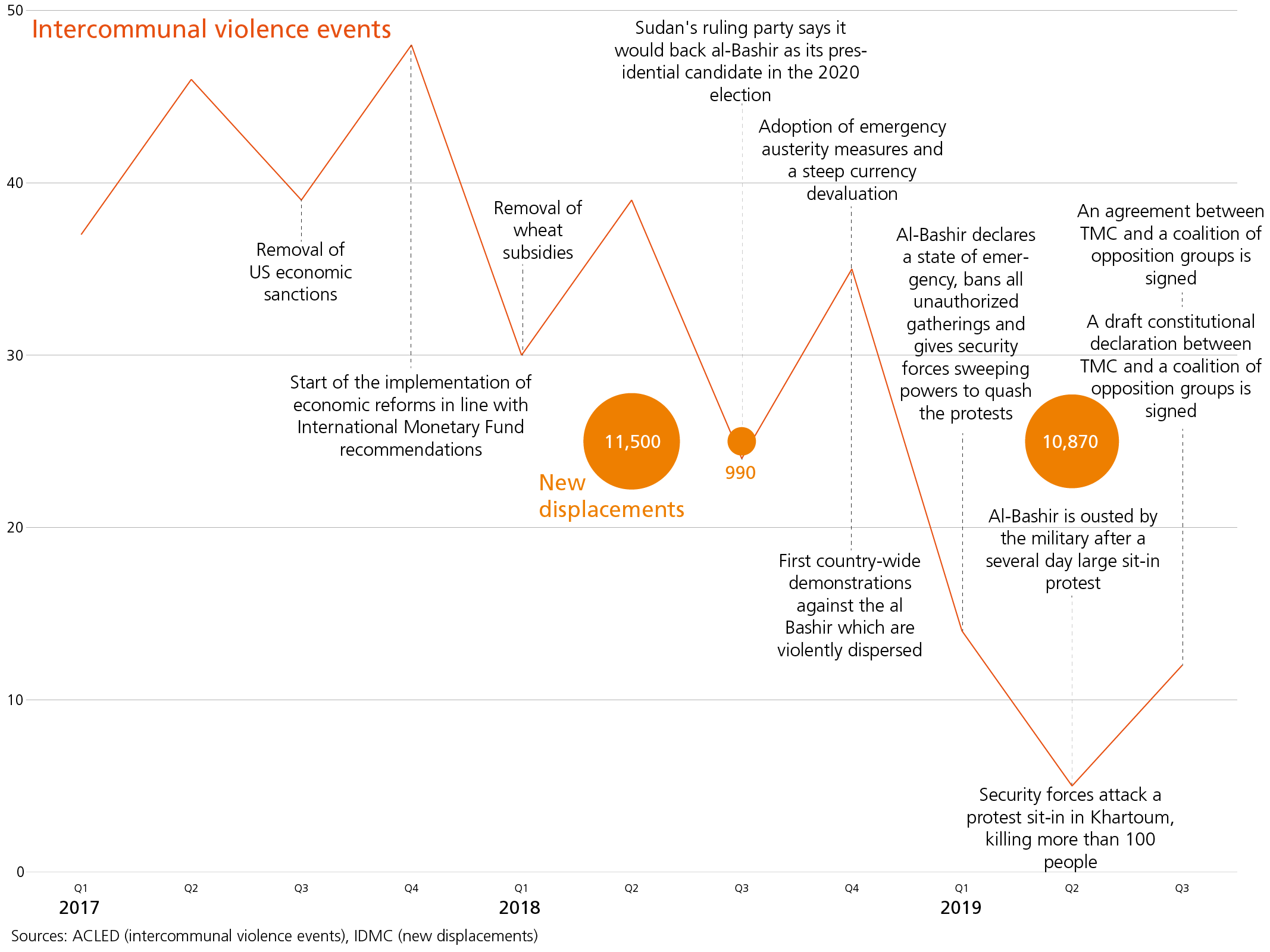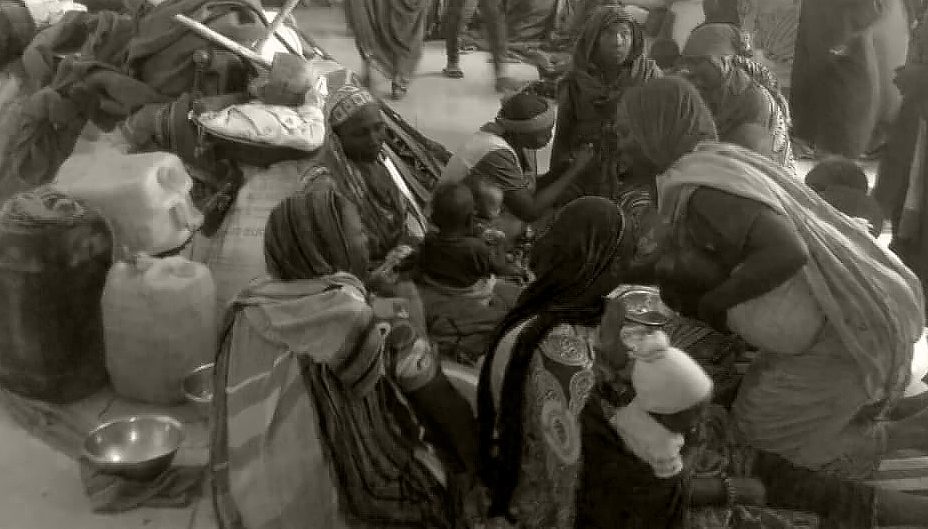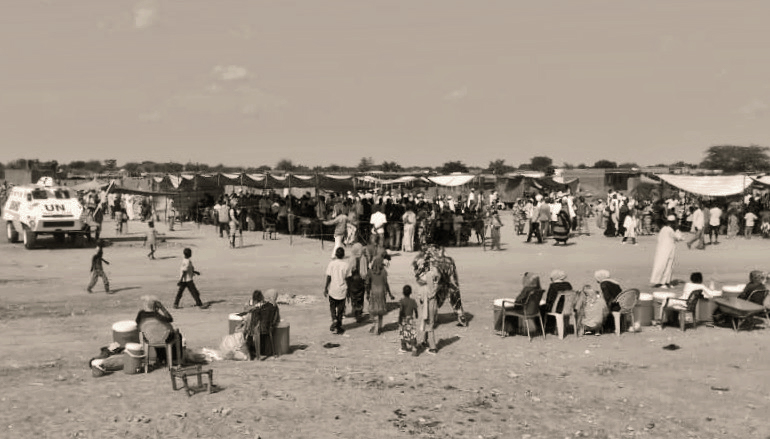Kalma Camp, Darfur, Sudan.
(cc) AlAdwaa.online | Abdelrahman Ibrahim | September 22, 2019
Settling the 17-year-old violent conflict in the west Sudanese region of Darfur and repair damage done by ousted President Omar al-Bashir’s regime will take time, leaving millions of displaced in a state of uncertainty.
Zainab, a 45-year-old displaced woman, and her family decided to leave the Gereida Camp, south of Nyala in West Darfur, to return to their home. Upon arrival a group of armed herders attacked the family’s farm, killing Zainab and her 7-year-old son Mohamed Osman Ismail.
When instances of inter-communal and ethnic violence decreased in 2019 following the period of civil unrest that led to the toppling of the al-Bashir regime, many internally displaced persons, like Zainab and her family, thought the time to return home has finally come. However, the tense political and economic situation has worsened relations between communities.
As a result of inter-communal fighting and clashes over resources in East and Central Darfur, as well as in White Nile and South Kordofan states, nearly 11,000 new displacements occurred in Sudan between April and June 2019 according to the Internal Displacement Monitoring Centre (IDMC).

In addition to these concerns, IDMC also observed an increase in violence from the Rapid Support Forces (RSF) – a paramilitary branch of the Sudanese Intelligence Bureau, also known as the Janjaweed, formed to fight the non-state armed groups in Darfur. While it kept a low profile during the political and economic crisis, RSF activity skyrocketed after the fall of Bashir.
For example, according to a statement issued on September 29, 2019, by the General Coordination of Darfur Displaced People and Refugees, an independent civilian institution formed by refugees, “at exactly 9:00 AM on September 28, 2019, the Janjaweed militias attacked civilians in the Sando village and a number of villages in the Mukjar District. Three villages were looted and burnt: Ramaliya, Didi and Ordo.”
The statement, signed by Adam Rijal, the coordinator responsible for camps in the El Geneina Directorate, West Darfur, also says that during these attacks two people were killed, eight people were injured, and 30 children were abducted.
Yacoub Mohamed, leading the General Coordination of Darfur Displaced People and Refugees, says that there is still a systematic plan to change the composition of the population in certain areas. Violence is used as a means to gain access to land, a practice that was widespread when the former regime was still in power.
Mohamed told AlAdwaa.online that “after the regime change, we hoped to see this issue addressed. We also hoped to see the return of displaced persons to their normal lives. But this is not possible at present, as attacks on farmers by armed herders continue and armed groups affiliated with the former regime occupy the land of IDPs.”
“The issue of these ‘new settlers’ is a reality mainly in areas rich in pastures and water, especially in west and south Darfur,” explains Noureddin Brima, a writer, historian and member of the Sudanese Professionals Association in South Darfur.

(cc) AlAdwaa.online | Abdelrahman Ibrahim | September 22, 2019
“Addressing the issue of new settlers is one of the most important ones to achieve just peace.”
Noureddine Brima
Brima, who played a significant role in the protests leading to the fall of President al-Bashir’s regime, believes that “addressing the issue of the ‘new settlers’ is one of the most important ones to achieve just peace.” As a first step, Brima suggests the disarmament of all groups that were armed by the old government.
In its first meeting outside Khartoum, in the city of Nyala, South Darfur State held on September 26, 2019, the Sovereign Council announced that they have a plan to tackle the proliferation of arms. According to Mohamed al-Faki, the council’s spokesperson, armed movements are willing to reach an agreement and to address the conflicts which the former regime has left unresolved.
Major General Khalid Mahmoud Hashim, the Governor of South Darfur State, says people are looking forward to seeing the current government addressing the obstacles to peace in Darfur. “We do not want these events to take us back,” he says given the recent bloody events.
“We do not want these events to take us back.”
Major General Khalid Mahmoud Hashim
The conflicts over resources and land, ignited and prolonged by the former regime are not easily settled, and so the crisis in Darfur is for now far from being over. Impaired by a resurgence of violence and consequently, people yet again fleeing their homes, the current situation continues to leave millions of people in a state of uncertainty about their return.

